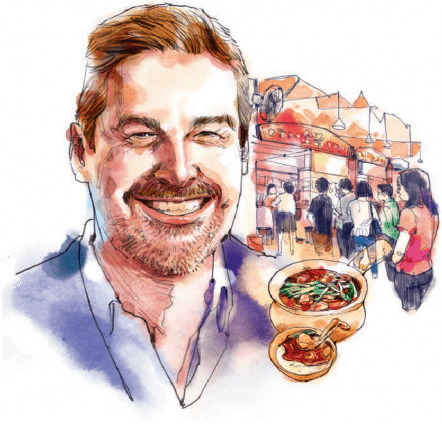Stories > Breaking Bread
Breaking Bread
Dave Acton, the newly appointed CEO of homegrown fast-food chain 4FINGERS, talks about food diplomacy and distils Singapore’s culinary scene.
BY CARA YAP
ILLUSTRATION KEN LEE
or Canadian Dave Acton, the unassuming act of sharing a meal personifies diplomacy.
“I'm a big believer that you get to know someone when you break bread with him. The barriers between people start to fall when they share a meal. Whether it’s through learning about someone’s cuisine or how to eat something unfamiliar, the conversations I have around food accelerate a relationship much more so than countless meetings and phone calls,” he shares.

Dave Actonʼs introduction to Singapore cuisine was at a hawker centre where he unwittingly had his first taste of frog porridge – two servings in fact.
The newly appointed CEO of homegrown fried chicken brand 4FINGERS is no stranger to striking business deals, considering his breadth of experience in the food industry. Having started out his career more than 30 years ago at Pizza Hut in Canada, Acton went on to accept the role of Area Vice President of International Dairy Queen. This led to his move to Singapore in 2012 to set up Dairy Queen’s regional office.
Having established himself as a frontrunner in both the Western and Asian markets, Acton asserts that communal dining is key to forming common ground across cultures. “Sharing an experience together, whether it’s at a fine-dining restaurant or hawker centre, is immersive and takes the focus off the meeting agenda,” he rationalises.
DIVE RIGHT IN
Perhaps it’s not surprising that the industry veteran has eased into life in Singapore with the same deftness in which he manoeuvres his prandial conversations. “When I first arrived in Singapore, I was impressed by the organisation and efficiency of the city, as well as how easy it was to fit in and get around,” he shares.
Apart from some initial struggles navigating unfamiliar terminology, Acton adjusted to life in Singapore seamlessly. In fact, he is proud to share that when it came to his introduction to the country’s dining scene, he jumped in with both feet. “I was at a hawker centre and unsure of what to do, so I followed a Singaporean and joined a long queue at a stall. I asked for two portions of what the man in front of me had ordered – that was the first time I had frog porridge,” he shares.
“It Was Only After I Started To Explore Singapore That I Learnt About Peranakans And Other Sub-ethnicities, Mostly By Understanding Where A Dish Comes From...”
Dave Acton, CEO, 4FINGERS
Hawker centres have a special place in this adventurous foodie’s heart, and he has embraced them with all their idiosyncrasies. “Behaviours like ‘choping’ for your table are unacceptable to Canadians, but to me they make sense in the context of this region, when you take into account its facilities and environment,” he explains.
With that, he weighs in on Singapore’s recent efforts to nominate its hawker culture for UNESCO’s list of intangible cultural heritage: “I’m supportive of this, as having clean food and water in a safe and controlled environment is truly unique. Hawker centres are a big part of Singapore culture that’s tough to quantify. People visit them when they are hungry or want to watch the world go by, hence they keep neighbourhoods cohesive.”
Acton adds that he revels in the Lion City’s diverse culinary scene. Over his six years spent working in the country, he has noted an explosion of dining options at malls, brought about by the exodus of brick-and-mortar retail outlets. “I see a lot of creativity, but also many followers who just make little tweaks to other people’s concepts. I think the evolution of Singapore’s F&B scene will cause some of the concepts that are not well-run or well-branded to fall by the wayside,” he explains.
“When I Sit Down With My Colleagues For A Meal Or Coffee, I Learn So Much About Their Background And Why They May Lean A Certain Way.”
HEIGHTENED AWARENESS
Having an appreciation for the country’s restaurant business is one thing, but has he in any way been challenged or surprised by its culture? “I hate to admit that I used to lump Asians into broad categories. It was only after I started to explore Singapore that I learnt about Peranakans and other sub- ethnicities, mostly by understanding where a dish comes from or how a particular style of cooking has evolved,” says Acton, who professes a fascination for the history of cultures and civilisations.
Within a professional setting, on the other hand, he has had to adjust to a different style of communication.
“The work environment in Singapore tends to be a little more buttoned down, and people aren’t as forthcoming as North Americans at meetings.”
Once again, he has turned to food to bridge the cultural divide. “When I sit down with my colleagues for a meal or coffee, I learn so much about their background and why they may lean a certain way,” he explains.
In turn, his Singaporean counterparts have grown comfortable with his spontaneity. “I typically dive right into a situation and try to get involved,” he shares. Through their interactions, they have also gained insights on Western cuisine.
Fresh off a gap year that saw him exploring off-the-beaten-path destinations in Southeast Asia on a motorcycle, the avid biker brings back new experiences over food. “I stopped at rural villages, where I was intrigued by how subsistence farmers could create meals out of almost anything edible,” he shares. True to his intrepid spirit, Acton spends his weekends in Singapore wandering – and dining – around unfamiliar MRT stations. “I've had some memorable meals in Geylang, Little India and Chinatown, as well as conversations with servers who do not have a strong command of English,” he shares. The gourmand doesn’t hesitate to name his favourite food. “Laksa and a couple of Indian restaurants are my go-tos,” he says.
